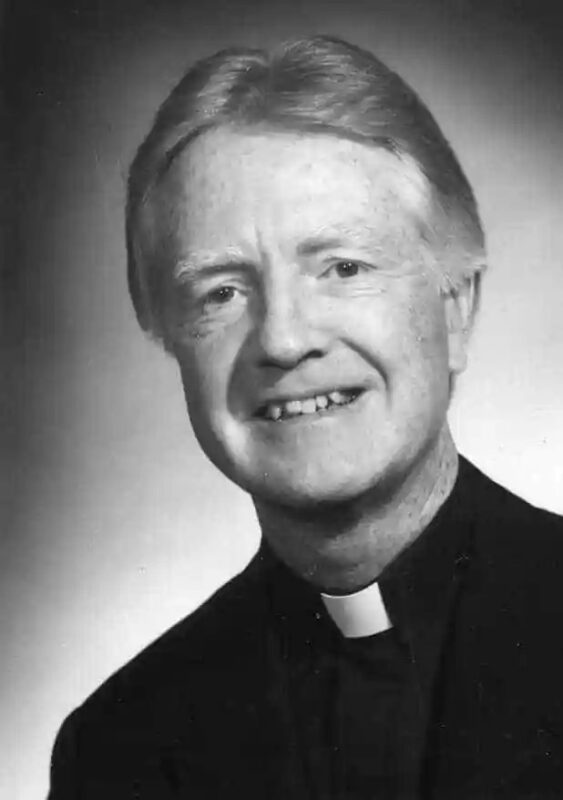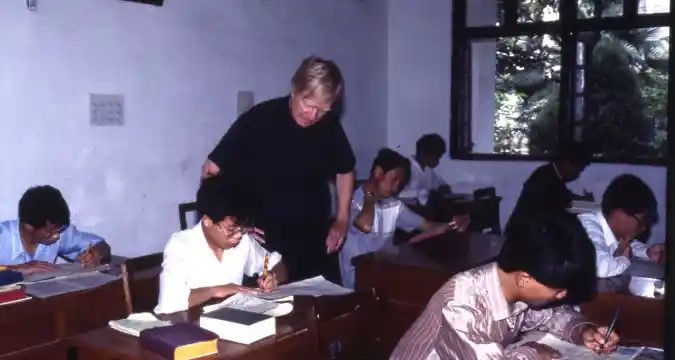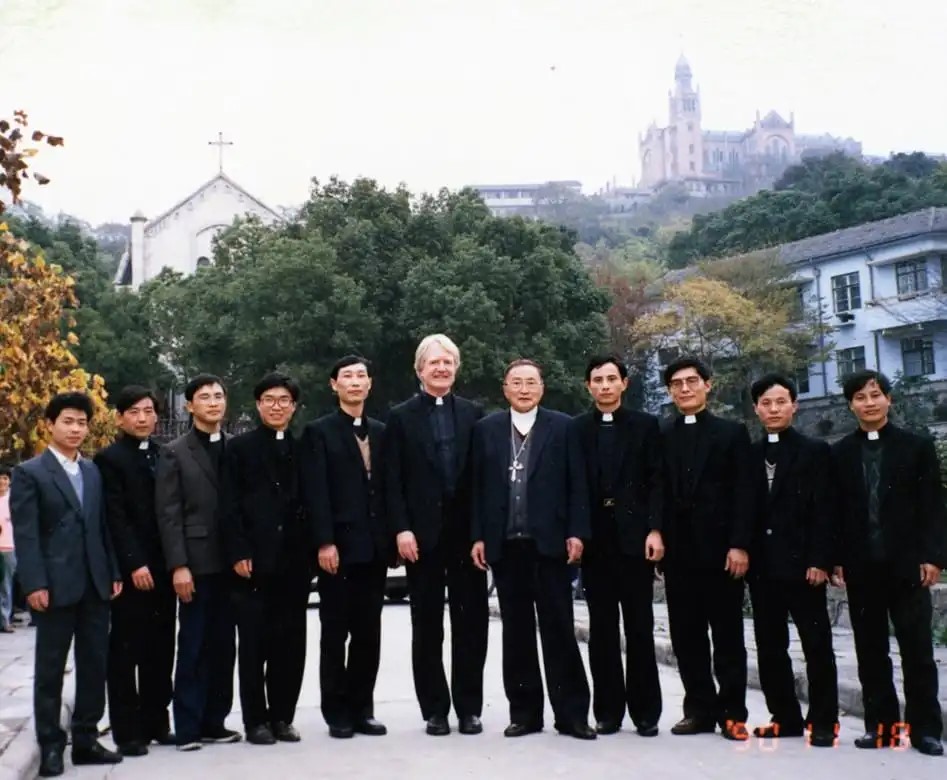
China Bridge (神州橋樑)_2022/Aug
A pioneer of overseas formation in China
Maryknoll Father Lawrence William Flynn [1928 to 2022], a missionary in China, was a pioneer in starting overseas formation programmes for Chinese priests and sisters, a seed sown 31 years ago. His foresight and mentorship are well remembered by Catholics in China.

Father Flynn, known to be “the first foreign priest allowed to teach” at the Sheshan Regional Seminary in Shanghai, was one of the visiting scholars in China who made countless efforts to guide “youthful and vibrant” priests and sisters, aglow with hope, to nurture a new leadership for the Church in China.
The American missionary passed away on July 9 at the Maryknoll home in New York. He was 93-years-old and had been a priest for 35 years. He first entered the Maryknoll in 1948, then worked in education and development before rejoining in 1981, and underwent overseas training in Hong Kong and Tanzania.
Ordained in 1987, at the age of 59, Father Flynn was assigned to Maryknoll’s Hong Kong Region [1987 to 1998]. He taught English in China, remaining until 1994, and stayed in Hong Kong for pastoral ministry. Four years later in 1998, he returned to the US for other ministries.
Teaching in China

Father Flynn shared his joyful experience teaching in China in an article for the 1 September 2016 issue of Maryknoll Magazine. He recalled that Maryknoll co-founders, Father Thomas Price and Father James Walsh, on their first mission to China in 1918, discovered soil there “for sowing seeds of the Gospel.”
In 1987, he taught English at a college in Suzhou, Jiangsu province. “The students called me Dr. Lawrence, although everyone knew I was a Catholic priest.” They presented him with a Chinese name: Lin Cie-hua, explaining that Lin is similar to Flynn and Cie-hua translates to “true friend of China.”
Sometime later, he transferred to teach at Fudan University in Shanghai. He was surprised by the school president’s request “to give a lecture on the historical and cultural aspects of the Bible,” which was generally unknown in China then.
Approached one day by the Shanghai authorities, he was asked if he could teach at the Sheshan Regional Seminary. “I had to ask permission from Maryknoll leadership and they, in turn, from the Vatican. The Vatican’s response was: ‘Whatever Maryknoll can do for the seminarians there, is the future of the Church China’,” he wrote.
Bishop Aloysius Jin Luxian of Shanghai [1916 to 2013] also invited other scholars to teach at Sheshan: American Jesuit Father Edward Malatesta [1932 to 1998], on sacred scripture; Salesian Cardinal (then Father) Joseph Zen Ze-kiun of Hong Kong, a native of Shanghai, on dogmatic theology; and Father Thomas Law Kwok-fai of Hong Kong, on liturgy. Their presence “would enhance academic exchange among religious scholars” inside and outside of China UCAN reported on 25 October 1989.
Sheshan was the first regional seminary to reopen in October 1982 after 30 years’ of repression. In September 1989, it had 138 seminarians from 37 dioceses in China.
Vatican II renewal and young leadership

The Church in China missed out on the Second Vatican Council [1962 to 1965] as religious activities in China ceased during the Cultural Revolution [1966 to 1976]. In 1989, the Sheshan Regional Seminary adopted the Vatican II liturgy and the first Chinese Mass with the celebrant facing the congregation was held at its chapel on September 30, feast of St. Jerome.
Father Flynn and the visiting scholars concelebrated at the Christmas Midnight Mass in 1989 (UCAN, 27 December 1989), then and the Holy Week liturgy in 1990, at Sheshan both using the Vatican II liturgy and in Chinese.
“It was a joy to be among those faithful people from largely rural origins, whose families had miraculously preserved their Catholic faith amid repression,” Father Flynn noted. Later, he taught English at the National Seminary in Beijing.
“I then realised the dire need for quality education for Chinese seminarians. They were youthful and vibrant, but their teachers were very old priests unaccustomed to teaching,” he observed.
The Church in China was faced with a generation gap, inadequate education and a shortage of formators. Educating a young leadership was imminent.
Programmes for Chinese Catholics’ overseas studies
With the blessing of the Church leaders in China, Father Flynn developed “an overseas graduate training programme for Chinese seminarians” in the start of the Maryknoll-sponsored China Educators and Formators Project.
Father Flynn contacted cardinals in US cities affiliated with major seminaries to provide scholarships for mainland students. The programme was designed to bring Chinese priests, sisters and seminarians to the US for advanced degree education and spiritual training, to better prepare them to serve as seminary teachers and spiritual formators in China. It functions as a mutual effort between sending bishops in China and receiving bishops in the US.
The programme began with four Chinese seminarians in 1991, and grew to 45 Catholics by 1994.
In New York, Maryknoll Father Peter Barry, former editor of Tripod, told China Bridge/Sunday Examiner: “The students Father Flynn brought to the States for study were young Chinese priests and seminarians. Later sisters also participated. They studied at Catholic universities and Catholic seminaries.”
Two of the Chinese priests of the 1993 cohort commemorated Father Flynn. Bishop Paul Pei Junmin of Liaoning diocese thanked the missionary for his mentorship. “For 40 days, Father Flynn accompanied us, and sent us to our respective schools. And he would phone us from time to time, asking about our study and life. He encouraged us to study hard and stay in touch with our diocese.” He added, “He prayed the rosary with us.”
Father Zhen Xuebin of the Diocese of Beijing appreciated Father Flynn’s “foresight and vision of fostering a new generation of leadership for the Church in China. He is an approachable, decisive and good pastor who loves the Church in China.”
In 2016, the Project celebrated its 25th anniversary. Already, 138 young priests and sisters from 49 dioceses in China have studied at 25 educational institutions across the US. Maryknoll Sister Janet Carroll [1933 to 2019] recounted its development in an article published in the International Bulletin of Mission Research in [2017, Vol. 41[2]].
As of 2016, 11 Chinese students had been conferred with a doctorate degree, 56 with a licentiate or a master’s degree, and two with bachelor’s degrees. Academic disciplines studied ranged from sacred scripture, liturgy and systematic theology to spiritual direction and pastoral counselling.
Furthermore, five of the priests in the programme were appointed bishops with papal approval; others serve as seminary professors and pastoral leaders. Several sisters were elected to the leadership of their congregations, and some direct retreat centres, provide formation training and manage social service agencies.
Sister Carroll added that Maryknoll leaders “maintained regular communication” with the Congregation for the Evangelisation of Peoples in Rome about the Project.
Fostering the growth of Christianity
“Upon graduation, the Chinese priests and sisters returned to China [and] have been able to update the Chinese Church, which [was] cut off from the universal Church for over 30 years, having missed out on the renewal introduced by the Vatican II,” Father Barry noted.
“While Father Flynn started the Maryknoll programme for study in the States, other missionary congregations from Europe launched similar programmes in their own countries,” he said.
From 1990s onwards, Catholics in China were sent to study in Europe and Asia, including Belgium, England, France, Germany, Ireland, Italy, Spain, the Philippines, South Korea, Macau, Taiwan and Hong Kong.
“Perhaps it can be said that Father Flynn was a pioneer in starting overseas formation programmes for Chinese priests and sisters. The work he started continues to the present day” and the work of priestly and religious formation continues,” he said.
Formators in China said the training programmes open the horizons of Chinese students and connect them with the universal Church. They nourish renewal and strengthen the growth of Christianity, all in bringing the gospel to the people in China.
AL


 ENG
ENG